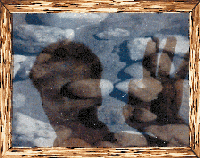
 Liquid Views
Liquid Views



|
Narcissus drowned in himself. The reflection on a water surface
flooded by waves is dwindling. The access to the self remains closed.
Central theme is the transition from the rational world to the spheres of unconsciousness and
vice versa. From the unconsciousness the ego juts out as the consciousness.
But man only finds to his self, when he brings unconsciousness and
consciousness into accord. At this point the process of individuation and
cognition begins. The fountain - sole element of the setting - is a
metaphor for a digital universe, which is opened by the observer's eye. The
Narcissus of the media age is watching the world through a liquid mirror
that questions our normal perception. A glass mirror has no inner life
retaining our image. The digital image, however, can be stored,
manipulated, and altered within the computer. In "Liquid Views" the mirror becomes the actor. The transformed, hallucinatory image originates on the other side of the mirror, which normally is not accessible to us. Morpheus the "shaper" - a son of the god of sleep - appears in men's dreams in changing characters. He gave the technique of morphing its name.The images' shape is altered by the computer in real time (Realtime Morphing). Water surface, gentle waves, water sounds causes us to believe in an artificial nature. "Liquid Views" replicates the rippling water effect of gentle waves found in a well. The visitor approaches and sees his image reflected in the water - embedded in a fluid sphere of digital imagery. He tries to intervene, the realistic impression of the simulated water seduces the viewer to stroke the horizontal projection screen. By touching the water surface (sensitive glass) he changes his image by haptic control, like image change in floating water. The innovative interface allows an intuition-based interaction with the computer. Narcissus is the myth of the profound moment when man looks at himself and questions himself. The virtual image supports our capacity for observing our world both in the (perceptive) reality and in (reflective) virtuality. Touch becomes vision.
|